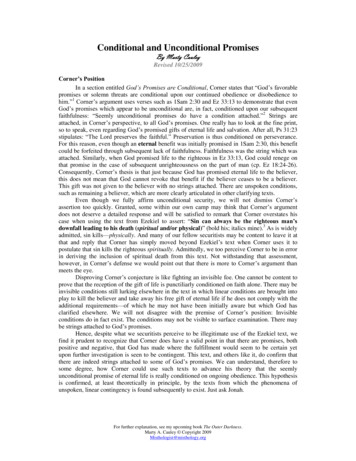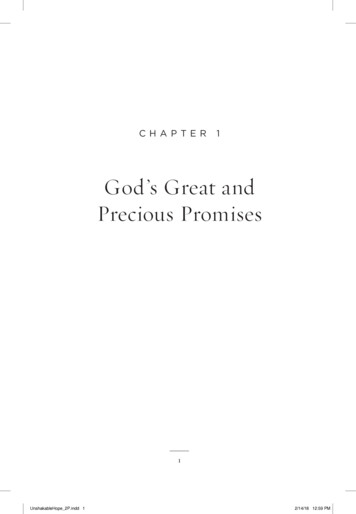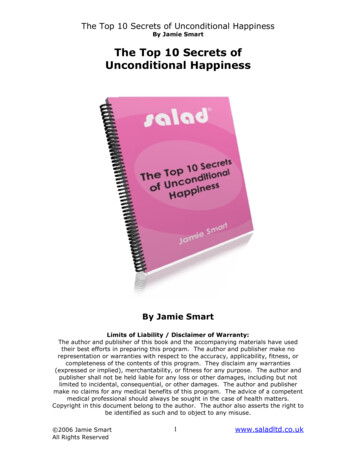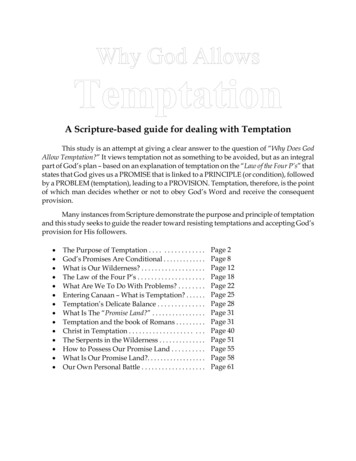
Transcription
Conditional and Unconditional PromisesBy Marty CauleyRevised 10/25/2009Corner’s PositionIn a section entitled God’s Promises are Conditional, Corner states that “God‟s favorablepromises or solemn threats are conditional upon our continued obedience or disobedience tohim.”1 Corner‟s argument uses verses such as 1Sam 2:30 and Ez 33:13 to demonstrate that evenGod‟s promises which appear to be unconditional are, in fact, conditioned upon our subsequentfaithfulness: “Seemly unconditional promises do have a condition attached.”2 Strings areattached, in Corner‟s perspective, to all God‟s promises. One really has to look at the fine print,so to speak, even regarding God‟s promised gifts of eternal life and salvation. After all, Ps 31:23stipulates: “The Lord preserves the faithful.” Preservation is thus conditioned on perseverance.For this reason, even though an eternal benefit was initially promised in 1Sam 2:30, this benefitcould be forfeited through subsequent lack of faithfulness. Faithfulness was the string which wasattached. Similarly, when God promised life to the righteous in Ez 33:13, God could renege onthat promise in the case of subsequent unrighteousness on the part of man (cp. Ez 18:24-26).Consequently, Corner‟s thesis is that just because God has promised eternal life to the believer,this does not mean that God cannot revoke that benefit if the believer ceases to be a believer.This gift was not given to the believer with no strings attached. There are unspoken conditions,such as remaining a believer, which are more clearly articulated in other clarifying texts.Even though we fully affirm unconditional security, we will not dismiss Corner‟sassertion too quickly. Granted, some within our own camp may think that Corner‟s argumentdoes not deserve a detailed response and will be satisfied to remark that Corner overstates hiscase when using the text from Ezekiel to assert: “Sin can always be the righteous man’sdownfall leading to his death (spiritual and/or physical)” (bold his; italics mine).3 As is widelyadmitted, sin kills—physically. And many of our fellow securitists may be content to leave it atthat and reply that Corner has simply moved beyond Ezekiel‟s text when Corner uses it topostulate that sin kills the righteous spiritually. Admittedly, we too perceive Corner to be in errorin deriving the inclusion of spiritual death from this text. Not withstanding that assessment,however, in Corner‟s defense we would point out that there is more to Corner‟s argument thanmeets the eye.Disproving Corner‟s conjecture is like fighting an invisible foe. One cannot be content toprove that the reception of the gift of life is punctiliarly conditioned on faith alone. There may beinvisible conditions still lurking elsewhere in the text in which linear conditions are brought intoplay to kill the believer and take away his free gift of eternal life if he does not comply with theadditional requirements—of which he may not have been initially aware but which God hasclarified elsewhere. We will not disagree with the premise of Corner‟s position: Invisibleconditions do in fact exist. The conditions may not be visible to surface examination. There maybe strings attached to God‟s promises.Hence, despite what we securitists perceive to be illegitimate use of the Ezekiel text, wefind it prudent to recognize that Corner does have a valid point in that there are promises, bothpositive and negative, that God has made where the fulfillment would seem to be certain yetupon further investigation is seen to be contingent. This text, and others like it, do confirm thatthere are indeed strings attached to some of God‟s promises. We can understand, therefore tosome degree, how Corner could use such texts to advance his theory that the seemlyunconditional promise of eternal life is really conditioned on ongoing obedience. This hypothesisis confirmed, at least theoretically in principle, by the texts from which the phenomena ofunspoken, linear contingency is found subsequently to exist. Just ask Jonah.For further explanation, see my upcoming book The Outer Darkness.Marty A. Cauley Copyright 2009Misthologist@misthology.org
2JonahJonah was given a message by God: “Yet forty days and Nineveh will be overthrown”(Jonah 3:4). The outcome would appear to be certain. So why did Jonah jump on a ship ratherthan jump at the chance to proclaim a message of destruction to a people he wanted to seeoverthrown? As one reads this historical account, it becomes apparent that Jonah‟s knowledge ofGod‟s character allowed him to accurately anticipate that the seemingly unconditional promiseGod made to destroy Nineveh was actually contingent on the response of the wicked living inNineveh. Jonah fled because he feared that instead of Nineveh being overthrown, it might turnout that the destruction God promised would be overthrown instead. Those receiving thisproclamation suspected that the forebode of their obliteration might be reversible andconsequently responded with an attitude which questioned the actual fulfillment: “Who knows,God may turn and relent, and withdraw His burning anger so that we shall not perish?” (Jonah3:9). “Who knows?” Jonah knew. In fact, he explains that this is the reason he jumped on theboat rather than jumped at the chance to preach this message: “I knew that Thou art a graciousand compassionate God, slow to anger and abundant in lovingkindness, and one who relentsconcerning calamity” (Jonah 4:2). So did God tell Jonah a whale of a lie?Given the bluntness with which Jonah replies to God, we suspect that if Jonah had thoughtthat he could morally accuse God of lying, then Jonah would not have hesitated to do so. Instead,the only charge Jonah brings against God is with being gracious. Jonah complains because Godchanged His mind regarding the calamity God had promised. Similarly, when God promises apositive outcome, He may relent concerning the positive outcome. This is Corner‟s point. Andwe are forced to concede this to be the case. But Corner goes beyond the biblical text byimplying that all (rather than some) of God‟s promises are (rather than merely may be)contingent in their fulfillment on our ongoing faithfulness. It is to this excess that we must object.But not all objections to Corner‟s argument are valid. Many (even of those who affirmunconditional security) would, with the children of Israel, respond to Corner, if not to GodHimself, that “the way of the Lord is not right” (Ez 18:25)—if it involves the Lord not keepingHis positive promises when the Lord does not mention any explicit subsequent conditions wheninitially giving the promise. Thus we can understand, to a degree, Corner‟s frustration with thosewho affirm unconditional security since, in certain cases at least, God‟s promises which appear tobe unconditional may upon closer examination prove to be conditional despite our initialimpression. And to a certain extent, we might even feel Jonah‟s resentment of God‟s relentment.It is not right for God to renege on His promises. Did God not in as much as promise Jonah thatHe would destroy Nineveh? So why did Jonah not accuse God of not doing the right thing andpout: “Shall not the Righteous One do right?” Abraham asked as much, “Shall not the Judge ofall the earth deal justly?” (Gen 18:25) Here, we find the first Jew, Abraham, jewing God downfrom making an unconditional promise to destroy Sodom (regardless of how many righteouspeople may have lived there) into making a conditional promise that was contingent on findingfifty, then forty-five, then forty, then thirty, then twenty, then only ten righteous people withinthe city. From the nature of the Deity with whom they dealt, Abraham and Jonah perceived thatthey could not accuse God of lying even when He changed His mind. Abraham was counting onthe fact that he could change God‟s mind.Amoral MutabilityHow then are we to follow the example of Abraham and Jonah in reconciling the fact thatGod can change His mind concerning promises He has made and yet not be considered a liar?How can we harmonize the fact that God does indeed change His mind when elsewhere we aretold, “God is not a man, that he should lie, nor a son of man, that he should change his mind.Does he speak and then not act? Does he promise and not fulfill?” (Num 23:19; NIV) Cornerbelieves God‟s promises are conditional. This text seems to say otherwise. Yet, we cannot stophere and claim victory over Corner‟s argument because there is more to this story than meets theeye. As is well known, we can elsewhere find the affirmation that God does not lie or change HisFor further explanation, see my upcoming book The Outer Darkness.Marty A. Cauley Copyright 2008Misthologist@misthology.org
3mind (1Sam 15:29). But at the same time we find multiple affirmations that God does in factchange His mind (Ex 32:14; Jonah 3:10).Men not only change their mind amorally but also immorally. God never changes Hismind immorally. Thus, we might respond analogously that even among men it is recognized thatthere are matters about which a man may change his mind without being considered a liar. Andthe same is true of God. God does not change His mind regarding matters that would make Him aliar (Heb 6:18). But analogies can only be pressed so far. The analogy of comparing God to menbreaks down since the text explicitly says: “God is not a man that he should change his mind.”We take this to mean that God is not a man that He could change His mind in such a manner thatwould make Him a liar. He never changes His mind in a manner that would be inconsistent withthe justice and grace of His own nature. Since man can lie, man is incapable of making animmutable promise. Conversely, it must be acknowledged that God is capable of makingimmutable promises. As a matter of fact, that is the only kind of promise He can make (1Kings8:56; 2Cor 1:20). Eternal life, in fact, is a promise (2Tim 1:1). Paul clearly regards this promiseof eternal life as immutable since it was promised by “God who cannot lie” (Tit 1:2). It is at thisjuncture that we spot weaknesses, major ones, in Corner‟s argument.First, Corner cites examples of texts which show that God can change His mind. But hefails to consider the texts on the other side of the discussion which indicate that God cannotchange His mind. Second, this failure in Corner‟s treatment leads to a failure in his logic in thathe misses the logical corollary of a balanced deliberation which considers text on both sides ofthe equation. Logically, just because there are some promises about which God can change Hismind because they may be dependent on unspoken contingencies, does not mean necessarily thatGod can change His mind regarding every promise. Not every promise is dependent upon suchsubsequent contingencies. Just ask Abraham.Unilateral PromiseWhen God appeared as a flaming torch that passed between the pieces of the sacrificewhich were cut in two, the Lord made an unilateral covenant with Abraham which could not becontingent upon Abraham‟s subsequent faithfulness, and the Lord clearly signified that fact toAbraham by passing between the pieces without Abraham (Gen 15:17-18). This was the objectlesson that God provided Abraham by which Abraham could rest assured that God could notviolate the promise without violating His own integrity. God can and does make promises whichare not conditioned on the recipient‟s subsequent faithfulness. No invisible strings could beattached. But by failing to note (or at least admit) this verity, Corner calls the integrity of his ownargument into question.4 Just ask Haley.Alleged Discrepancies of ConditionalityThe backbone of Corner‟s defense for viewing all of God‟s promises as implicitlyconditional is found in his citing classic texts which reveal God changing His mind. The text thatCorner uses to introduce his section entitled God’s Promises are Conditional is Jer 18:7-10. InHaley‟s book Alleged Discrepancies of the Bible, after supplying a two-column grouping of textswhich appear to be at odds with one another in asserting that God is changeable versusunchangeable, Haley likewise uses Jer 18:7-10 to commence the premise of his solution:Here is brought clearly to view the underlying condition, which, if not expressed,is implied, in God‟s promises and threats. Whenever God, in consequence of achange in character in certain persons, does not execute the threats or fulfill thepromises he made to them, the explanation is obvious. In every such case, thechange is in man, rather than in God” (italics his; bold mine).5Very well, we are all in agreement that this passage, and ones like it, brings out theimplicit underlying contingency that may exist in God‟s promises. Whenever we see God changeHis mind regarding a positive or negative condition, we can be certain that there was anFor further explanation, see my upcoming book The Outer Darkness.Marty A. Cauley Copyright 2008Misthologist@misthology.org
4underlying condition (at least for the individual realization). The problem is that Corner hassought to press this limited concurrence to mean that there is underlying contingency in all ofGod‟s promises. But again, we will not dismiss Corner‟s argument just because of this mistake.In Corner‟s defense, we will acknowledge that by our best estimation it seems that Haley is ofthe same opinion as Corner in perceiving universal conditionality underlying all of God‟spromises. But unlike Corner, Haley supplies two columns pertaining to the discussion of suchtexts: one side dealing with God‟s immutability, the other with His mutability. Haley explainsthat precisely because God is immutable (changeable) in His character, He must be mutable(changeable) in His dealings with men and His emotions toward them. Splendid, we fully agree.Further, Haley makes a most important observation that is not mentioned by Corner: “Some ofhis [God‟s] declarations are absolute and unconditional; the greater part, however, includingpromises and threatenings, turn upon conditions either expressed or implied.”6Apparently, Haley makes a distinction between God‟s declarations and promises andthinks that God‟s promises are always conditional, at least by implication. If we could but affirmfrom Haley‟s discussion that he believes that God‟s immutable character causes some of Hispromises to be unconditional and some to be conditional, then we would be in full accord withHaley‟s discussion of immutability. Internal consistency within Haley‟s discussion would seemto require that he agree with us that this is indeed the case. And we have seen passages abovewhich link God‟s promises with His immutability. Unfortunately, we must hesitate from citingHaley as being in full agreement with our position in that some of Haley‟s subsequent commentslead us to suspect that he believes God is mutable in all His dealings with men. Even his internaldiscussion within the section of immutability gives the impression that Haley believes that achange in man requires a corresponding change in how God deals with man. Correspondingly, inHaley‟s estimation, if a believer actually ceased to be a believer, he would lose eternal life.7 Soas it is, we must cite Haley as being in agreement with Corner‟s thesis, even though to Haley‟scredit he digs deeper than Corner in that Haley acknowledges that the conditionality is rooted inGod‟s mutability and even deeper still in recognizing that God‟s mutability is founded uponGod‟s immutability. Surprisingly, Haley evidently fails to deduce that since some of God‟sdeclarations are unconditional, some of God‟s promises (such as the promised gift of life) areunconditional as well. From his own analysis, Haley should have deduced that some of God‟spromises are unconditional while most are conditional. But his failure to do so causes us toregard him as a Calvinistic advocate of conditional security.We, therefore, call Haley to the witness stand as a hostile witness to our affirmation ofunconditional security. In doing so, we find in our cross-examination of Haley‟s Calvinisticconcurrence with Corner‟s conditional security that Haley has gathered evidence regarding God‟simmutability which may serve as a foundation from which to offer our objection to the CornerHaley opinion that 1Sam 2:30 proves that any time there is a subsequent change in the man whohas received the promise, then there may no longer be an applicability of the promise.8 They seekto turn a limited truth into a universal truth and in doing so have overstepped the boundaries ofthe text.It comes as no surprise when Calvinists join their fellow conditional securitists in theArminian camp in affirming conditional security from a text such as 1Sam 2:30: “Therefore theLord God of Israel declares, „I did indeed say that your house and the house of your father shouldwalk before Me forever‟; but now the Lord declares, „Far be it from Me—for those who honorMe I will honor, and those who despise Me will be lightly esteemed.‟” In commenting on thisverse, Smith asks, “Can then a promise of God be withdrawn?” His answer is an unqualified,“Yes, assuredly.” Honoring God is “one of these conditions essential on man‟s part to secure thefulfillment of God‟s promises.”9 In short, if you want security, you will have to secure it byhonoring God. One would deduce from such unqualified statements that to secure the fulfillmentof God‟s promises regarding eternal life one must honor God throughout one‟s life. Thisconditional security is the joint premise of both Arminianism and Calvinism.For further explanation, see my upcoming book The Outer Darkness.Marty A. Cauley Copyright 2008Misthologist@misthology.org
5Our PositionOur thesis, in contrast, is that some of God‟s immutable declarations are tied irreversiblyto His character so as to rule out the possibility of linear contingency. To be sure, God, who isfaithful and just (Dt 15:4), may nevertheless spurn Israel whom He has begotten as a son(Dt 32:18-19). Also, God may divorce Israel whom He has married as a wife (Jer 3:8). We willfurther concede that these texts typologically reveal how God may deal with present daybelievers. And granted, from the joint conditional perspective of both Arminianism andCalminianism, a text like 2Tim 2:13, which is addressed to NT believers, is taken to mean that“if we are faithless, then God remains faithful” to His promises to punish us with soteriologicalseverity (cf. Hendriksen, NTC). In complete contrast, we believe that 2Tim 2:13 affirmsunconditional soteriological security: Even if we are not faithful in keeping His word, God isfaithful to keep His word by keeping us.Even if we were to agree with soteriological conditionalists and conclude that 2Tim 2:13means that God is faithful to judge us, we would respond that this judgment is only misthologicalin scope. God will judge unfaithful believers at the JSC. God‟s despising us as His sons,divorcing us as His wife, or being faithful to His promises to punish us when we deny Him areall, at the most, pictures of conditional security exclusively at the misthological level. Not allsons will inherit the kingdom. Not all those betrothed to the Lord will be found worthy tobecome His bride. At the individual and misthological level, those who bed with the devil will begiven a certificate of divorce so that they do not become the Bride of Christ. At the soteriologicallevel, however, the Lord still loves us and we remain His own. One reason we believe that weremain His own is because of the Lord‟s promise and prayer to unconditionally keep us (Jn10:28-29; 17:11). But such matters aside, for the purpose of the present discussion, we will focuson the classic problem posed by Haley between God‟s immutability and mutability and theimpact this has on Corner‟s premise of universal changeability regarding promises.Errors by ConditionalistsTo illustrate a columnar comparison of conditional versus unconditional promises, we willjust consider a contrast within 1Samuel and Ezekiel themselves, since they are home to Corner‟sprimary texts: 1Sam 2:30 and Ez 33:13.Conditional Versus Unconditional PromisesConditional PromiseUnconditional Promise“Therefore the Lord God of Israel declares, „I did “And also the Glory of Israel will not lie orindeed say that your house and the house of your change His mind; for He is not a man thatfather should walk before Me forever‟; but now He should change His mind.” (1Sam 15:29)the Lord declares, „Far be it from Me—for thosewho honor Me I will honor, and those whodespise Me will be lightly esteemed.‟” (1Sam2:30)“When I say to the righteous he will surely live, “I, the LORD, have spoken; it is coming andand he so trusts in his righteousness that he I shall act. I shall not relent, and I shall notcommits iniquity, none of his righteous deeds pity, and I shall not be sorry; according towill be remembered; but in that same iniquity of your ways and according to your deeds Ihis which he has committed he will die.” (Ez shall judge you,” declares the Lord God‟”33:13)(Ez 24:14).As we have seen, Haley was less than perceptive in not acknowledging that theimmutability of God‟s character extends directly to God‟s promises. And Corner has been lessthan forthcoming about the fact that there are two sides to the contingency expressed in God‟spromises. In the very biblical books to which Corner makes his strongest appeals to demonstratethat God‟s promises are conditional, there are additional passages which indicate that God‟spromises are also unconditional. Therefore, Corner‟s section would have been better entitledFor further explanation, see my upcoming book The Outer Darkness.Marty A. Cauley Copyright 2008Misthologist@misthology.org
6Some of God’s Promises are Conditional. The omission of his admission that only some ofGod‟s promises are conditional raises severe questions regarding the integrity of his argumentsince Corner‟s premise seems to be that all of God‟s promises are conditional. Naturally, it ismuch easier for Corner to argue that God‟s promise of eternal life is conditional if there is nosuch thing as an unconditional promise! But once it is acknowledged that some of God‟spromises are unconditional, the premise of Corner‟s argument is falsified and his conclusion thatthe believer‟s security must be conditional is nullified.10Since a balanced discussion of the relevant facts will take into account the fact that Godcan and does make unconditional promises, the resulting question that must be asked is, WhenGod promises a believer eternal life as a free gift, is God conditioning the possession of eternallife on the believer‟s continued faith and/or faithfulness? In failing to acknowledge the possibilityof unconditional promises, Corner has seriously impaired his ability to deal adequately with thepossibility that unconditional securitists may be categorically correct in assigning soteriology tothe realm of unconditionality for those who have become believers—regardless as to whether ornot they remain believers.Errors by UnconditionalistsIn defending eternal security, Geisler devotes a paragraph to defending the premise that“salvation is an unconditional promise” and a joint paragraph to affirming that “salvation is anirrevocable gift.” To his credit, unlike the conditional securitists in the Calvinistic and Arminiancamps, Geisler cites 2Tim 2:13 in defense: “God can never take back the gift of salvation. He isbound by his own unconditional promise to be faithful, even if we are faithless, for he cannotdeny himself (2Tim. 2:13).”11 We also sincerely appreciate the fact that in an expandeddiscussion Geisler affirms that God‟s promise of the gift of eternal life is an irrevocable,unconditional promise and clearly grounds this affirmation in God‟s immutability: “When hemakes an unconditional promise he never fails to keep it (cf. Gen 12:1-3; Heb 6:16-18) .Theonly thing that makes God morally bound to keep his word is his unchangeable nature.”12 Welikewise believe that God‟s immutability makes His gifts unconditionally irrevocable.Unfortunately, however, just as Corner overstates the case for unconditional security byassuming that all God‟s promises are conditional since some of His promises are conditional,Geisler mistakenly seems to believe that just because God makes an immutable promise that itmust be unconditional.For example, Geisler wrongly cites Heb 6:17-18 as an example of an unconditionalpromise of eternal security. But this text is only an irrevocable promise to believers who meet thecondition of ongoing faith and faithfulness. Rather than being a soteriological promise as Geislermistakenly assumes, this text is a misthological promise. And lest it be thought that we are beingtoo hard on our fellow securitists, we will point out that even some of our fellow misthologists,such as Dillow, have fallen into the trap of taking the same short cut in defending eternal securityby soteriologically appealing to this text from Hebrews.13 But this misthological promise doesnot apply unconditionally to believers until they have completed the course of their lives andhave been found worthy of the reward. This text, like Heb 10:36, is saying that believers mustendure in order to “receive what was promised.” The question is, “What was promised—a gift ora reward?” A study of the word promise in the book of Hebrews readily confirms that thepromise of reward is in view. This is not to say, as we will see below, that a text like Heb 6:1718 has no value in affirming unconditional security, only we cannot take a short cut in exegesisand make a jump in logic to use this verse directly to support our position. We will not allowmissing links in our argument.Similarly, Peter‟s affirmation that a believer‟s inheritance is “imperishable and undefiledand will not fade away, reserved in heaven for you” (1Pet 1:4) is yet another text which some ofour well-meaning fellow securitists, such as Baker, have erroneously appealed to as teachingunconditional security: “It is God who has reserved it for us. Did He make a mistake in reservingit for us?”14 No. Of course not. God has not made a mistake in making the reservation. But Bakerhas made a mistake in thinking that just because a potential reward is eternal that it must beFor further explanation, see my upcoming book The Outer Darkness.Marty A. Cauley Copyright 2008Misthologist@misthology.org
7unconditional in its final realization. The reward is eternal, the reservation is not.15 Both this textas well as Heb 6:17-18 are talking about a misthological hope which only becomes anunconditional certainty when one has met the linear contingency whose terminus is to be found atthe end of one‟s life. In other words, a believer has to endure to the end of his life in order tocome into realized possession of this misthological hope. As careful misthologists, we cannotaccept the well-intentioned attempts of our fellow securitists or even misthologists, such asGeisler, Baker, and (to a limited extent) Dillow, in erroneously using such texts to affirm eternalsecurity. We will not accept faulty evidence in support of our thesis. Nor do we need to.Rewards are ConditionalThe problem, then, is that certain securitists and misthologists have failed to perceive thatsome of the texts which they are citing in defense of unconditional security are actually dealingwith the conditional nature of eternal rewards. By pointing out the conditional nature of rewardsin such texts, conditional securitists are easily able to offset these mistaken appeals byunconditional securitists. But in failing to recognize that such passages are talking about theconditional nature of rewards, unconditional securitists are making an even more grievous errorin that they condition one‟s salvation from hell on one‟s works.Corner has failed to note that the texts he poses in defense of underlying conditionalityonly confirm the conditional nature of rewards. It was God‟s intention that the realization of theperpetual priesthood should be an eternal reward for their conduct (Num 25:13; cp. Ex 29:9).God clarifies in 1Sam 2:30, however, that the realization of this reward is contingent on ongoingfaithfulness in that He would honor those who honor Him and despise those who despise Him.Undoubtedly, this is the language of rewards rather than of a gift. Being honored by God isconditioned on serving God and successfully enduring trails (Jn 12:26; 1Pet 1:7). This isobviously a reward motif based on service since rewards are conditioned on works. Inconditioning the gift of eternal life on the same thing as a reward, Corner is attempting tocondition the gift on works and thereby turn the gift into a reward.Missing LinksThe fact that a reward may be contingent on linear contingency is not exactly groundbreaking news. It does not take a rocket scientist to figure out that rewards are earned. Laypeople can figure that out, even if some scholars cannot. On the other hand, it would take a longchain of evolution in one‟s theological thought to successfully turn the imperishable gift ofeternal life (which a believer already possess) into a reward (which the believer must struggle tokeep and endure to obtain). There are too many missing links and categorical gaps in Corner‟ssoteriological phylogeny to think that he has successfully turned a gift into a reward. We do notearn a gift. Just because a gift and a reward share the similar characteristic of being a promisedoes not mean that they can be dug out of the text and arranged in a theological, evolutionary treeso as to link one inseparably to the other with a line of linear contingency. A gift is a differentkind of theological animal than is a reward. They cannot be mated to produce the hybrid thatCorner has imaged: a linear contingent gift. We may, therefore, liken Corner‟s futile exegeticalattempts to turn a gift into a reward with a biased collection of certain texts to the failed efforts ofevolutionists to make
God‟s promises which appear to be unconditional are, in fact, conditioned upon our subsequent faithfulness: “Seemly unconditional promises do have a condition attached.”2 Strings are attached, in Corner‟s perspective, to all God‟s promises. One really has to look at the fine print, so to speak, ev










